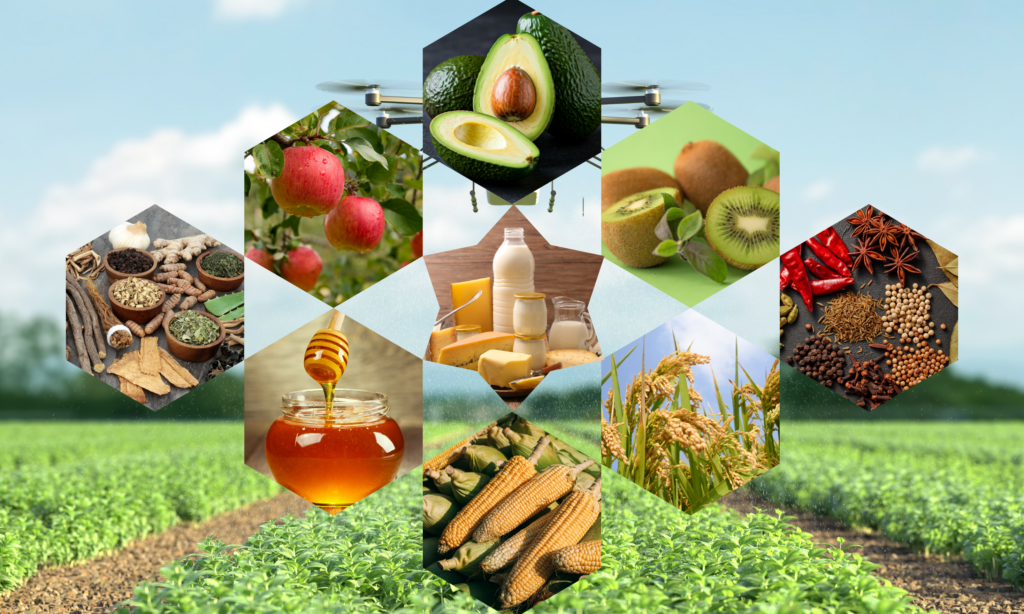Agribusiness includes all the activities related to farming, from growing crops and raising animals to processing, packaging, and selling food products. It connects farmers with markets and ensures that agricultural products reach consumers efficiently. Agribusiness helps meet the growing demand for food, improves food security, and supports economic growth. It also encourages better farming practices, supports rural communities, and works towards making food production more sustainable and resilient.
Agribusiness in Nepal
Nepal is largely an agricultural country, with farming playing a key role in its economy. Major crops include rice, wheat, maize, millet, barley, and various fruits and vegetables. The mountainous terrain supports terrace farming, which helps utilize steep slopes. However, challenges like poor infrastructure, limited market access, and outdated technology hinder growth. The government is working to improve these issues and boost the sector’s contribution to the economy. With effective planning and investment, Nepal’s agriculture can thrive and offer strong returns.
Objectives of Agribusiness in Nepal
- Enhancing Productivity: Improve crop yields and livestock production through modern techniques and technologies.
- Boosting Economic Growth: Strengthen the agricultural sector’s contribution to the national economy by creating jobs and increasing income for farmers.
- Improving Food Security: Ensure a stable and reliable food supply by increasing local production and reducing dependence on imports.
- Developing Infrastructure: Upgrade facilities for storage, transportation, and processing to streamline the agricultural supply chain.
- Promoting Sustainable Practices: Adopt environmentally friendly farming methods to protect natural resources and ensure long-term viability.
- Expanding Market Access: Enhance farmers’ access to domestic and international markets to increase their income and business opportunities.
Challenges
- Poor Infrastructure: Inadequate roads, storage facilities, and processing plants affect efficiency and market access.
- Limited Access to Technology: Outdated farming techniques and lack of modern equipment hinder productivity.
- Market Access Issues: Difficulty in reaching larger markets and securing fair prices can limit farmers’ income.
- Credit Constraints: Limited access to financial services and credit makes it hard for farmers to invest in improvements.
- Climate Change: Changing weather patterns and extreme conditions impact crop yields and livestock health.
- Lack of Education and Training: Farmers may lack the knowledge and skills needed to adopt modern practices and technologies.
Opportunities
- Technological Advancements: Adoption of modern farming technologies and practices can boost productivity and efficiency.
- Government Initiatives: Supportive policies and programs can improve infrastructure, access to credit, and market opportunities.
- Growing Domestic Market: Increasing demand for locally produced food presents opportunities for growth and expansion.
- Export Potential: Expanding into international markets can provide new revenue streams and increase farmer incomes.
- Sustainable Practices: Investing in eco-friendly farming methods can improve long-term sustainability and attract environmentally conscious consumers.
- Agricultural Innovation: Research and development in crop varieties, pest control, and farming techniques can lead to better yields and resilience.
Future of Agribusiness in Nepal
- Technological Integration: Adoption of advanced technologies such as precision farming, drones, and data analytics will enhance productivity and efficiency in agriculture. Improved technology can help farmers make informed decisions and optimize their operations.
- Infrastructure Development: Investments in infrastructure, including roads, storage facilities, and processing plants, will improve supply chains, reduce post-harvest losses, and provide better market access for farmers.
- Sustainable Practices: Growing awareness and emphasis on sustainability will lead to the adoption of eco-friendly farming practices. This includes organic farming, water conservation techniques, and integrated pest management, which can improve long-term productivity and environmental health.
- Government Support: Continued and enhanced government initiatives will focus on improving access to finance, providing subsidies, and implementing policies that support agribusiness development. These efforts will help address existing challenges and foster growth.
- Market Expansion: Increased focus on both domestic and international markets will offer new opportunities for Nepali agricultural products. Developing value-added products and exploring export markets will boost farmers’ incomes and diversify the industry.
- Education and Training: Enhanced educational programs and training for farmers will promote the adoption of modern agricultural practices and improve overall efficiency. Knowledge transfer will be crucial for implementing innovative techniques and improving productivity.
- Climate Adaptation: With ongoing climate changes, there will be a need for adaptation strategies to cope with new weather patterns. Research and development in climate-resilient crops and practices will help mitigate the impacts of climate change.
Agribusiness examples
Agribusiness is a broad industry that includes various types of companies and activities, from small family farms to large global food producers. This sector covers everything from growing crops and raising animals to processing and selling food products, playing a vital role in feeding people and supporting economies worldwide.
In Nepal, notable agribusiness companies include Planeteer Innovative and Research Consultancy Pvt. Ltd., Aakar Innovations Pvt. Ltd., Nepal Agro Industries, Himalayan Organic Farms, and Krishi Samagri Company Limited. These companies contribute to the sector through market research, sustainable farming tools, and various agricultural products and services, supporting the growth and development of the farming community.
Three main categories of agribusiness
The three main categories of agribusiness are:
- Production: Involves growing crops and raising livestock, including all activities related to farming and animal husbandry.
- Processing: Focuses on converting raw agricultural products into finished goods, such as milling, canning, and packaging.
- Marketing and Distribution: Covers the activities needed to get products from producers to consumers, including sales, logistics, and supply chain management.
Most profitable agribusiness
The most profitable agribusinesses globally typically focus on high-value, high-demand sectors. Some of the most profitable agribusinesses worldwide include:
- Poultry Farming: Profitable due to high demand for chicken and eggs and efficient production methods.
- Dairy Farming: Lucrative, especially for premium products like cheese and yogurt.
- Specialty Crops: High-value crops such as nuts and fruits offer strong profitability.
- Aquaculture: Profitable for controlled farming of species like catfish and shellfish.
- Agri-Tech Innovations: Growing profitability from advanced farming technologies and productivity enhancements.
Conclusion
Agribusiness is a diverse and dynamic field with strong profit potential. Key sectors like poultry farming, dairy production, specialty crops, aquaculture, and agri-tech innovations each offer unique growth opportunities. By adopting advanced technologies, focusing on high-value products, and improving production methods, agribusinesses can boost productivity, meet consumer demands, and achieve significant financial returns.





